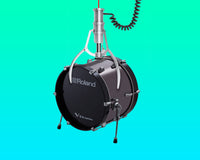Many bedroom producers have cultivated their mixing skills by working on their own stuff. There’s nothing absolutely wrong with it, but it has some huge limits.
Reasons why you shouldn’t mix only your tracks
You produce only certain genres.
Unless you’re a phenomenon, it’s most likely that you produce only a few genres you particularly love or are good at also because the sounds and tools you use are more suited for those genres.
You need time to produce (well) first.
Crafting a good record requires a certain amount of time in the production stage first; otherwise, you would mix something that’s not finished yet, and that might be drastically changed later. Basically a waste of energy.
You have full control over your projects.
Mixing a track requires a meaningful number of tweaks to each sound, and sometimes you might be tempted to apply those tweaks to the actual sample/preset or change something in the production to make it fit the mix. This isn’t wrong by default, but it can easily become distracting and bring you back to the production stage while you should focus on the mixing one.
You’re emotionally attached.
You worked on your track from the start and the amount of time spent on it usually deceives your brain from what a finished track should sound like for the simple reason that you’ve been used to how the raw version sounds. It takes time and experience to overcome this obstacle.
Last but not least,
You need to produce.
If you don’t have time to produce new tracks for whatever reason, you don’t have anything to mix unless you’ve downloaded some free stems for contests or exercising.
Reasons why you should mix for clients
If you feel like you’re in some way stagnating with your mixing skills and/or perspective, maybe it’s time to open up for some clients’ work.
Working for clients can open up a huge amount of doors, especially if you mainly see yourself as a producer, beatmaker, and/or songwriter.
You don’t need to be the best to help someone.
There will always be someone better than you at anything, but that doesn’t mean there’s a place for you too. There’s a ton of people looking for engineers to mix their tracks, and each one has specific needs such as delivery times, actual skills, or the service price.
If you have some skills, don’t let the imposter syndrome get in the way of reaching out in the first place and offering them.
You don’t have to focus on tweaking presets and patterns.
Mix engineers generally work on stems unless they have the chance to access the actual project file, which is generally not recommended, as we said before, especially if the clients don’t want any additional production at all. You have only the audio to deal with.
You learn how to mangle stems.
Working with stems can be quite frightening at first to someone who’s used to MIDI clips and fancy synths and modulations. Being able to manage stems within a session, especially as a producer, unlocks a new way of approaching audio, dealing with BPM-syncing, and other features you might not pay attention to, such as the default warping algorithms in Ableton, which can significantly alter a sound.
You learn how to sort a project.
While working on a track, you have all the time and chances to sort the project, creating groups, and labeling stuff. The same might not be as easy as while working on other people’s stems. It’s always recommended to send out properly renamed stems, but the way someone thinks is “proper” might not match with yours.
So, you need to reload everything in your DAW and create groups that both make sense for you to work with and for the track to make it sound the way it was conceived like several synths stacked together for a unique sound and drums subdivided into percussions, cymbals and main drums such as the kick and the snare.
You are forced to get the best out of each sound.
Your only job is to make things sound better. The fact that you aren’t allowed to tweak the production in an invasive way shifts your focus on the processing chain and on how it translates into the big picture. You aren’t distracted by getting a cool modulation anymore, and you now have time to actually study how one reverb is different from another, and the same goes for other types of processors and chains.
You are more objective with the final result.
As a mixing engineer, your first impression of the stems you receive will be close to the one of a casual listener, and, summed to your listening skills, you have the edge to discern what needs to be done to make it sound like a finished product.
You can try plugins you wouldn’t use.
Did you buy a bundle that comprises some VSTs you never paid attention to? Now it’s time to load them and see what their place is. There’s a chance that the plugin you’ve never used can be good for your mixing purposes or it can even be a good pick for your own tracks.
You approach different genres.
This is not always true, and it highly depends on who’s sending you the stems. Anyway, if you’re used to Hip Hop, there’s a chance you have friends or clients producing House or Pop. The best recommendation we can do about this is to learn the genre and not try to mix a House track with a “Rock” approach.
Different genres need different mixings. There isn’t an absolute mixing scheme that sounds nice on every genre, or, at least, it sounds “fair,” but it still sounds off when matched to other tracks in the same genre. For example, most genres don’t need heavy sidechain compression as it is used on EDM tracks.
By working on different genres, it can also help you learn their characteristics and implement them in your future tracks, or learn new mixing techniques that might have some space in other crossover genres.
You learn to respect the client’s vision.
Sometimes, there’s no need for your creative input, even if it’s only limited at the mixing stage, and you only have to respect the client’s vision. If this sounds sad to you, it actually is an opportunity to learn how to treat clients and also how certain genres need to sound.
If you are an EDM guy, you will be used to huge sounding masters, but that doesn’t mean that all the EDM has to be insanely pushed. Lo-Fi House is still EDM, but it’s sound relies on poor sounding elements by definition. You don’t need the same oomph from the kick and the bass as you’d need from a Big Room track.
The same goes for Trap. The element where there might be some controversy is the 808, which is heavily conditioned by the distortion and saturation. You might think it needs more harmonics while the client wants it clean and vice-versa.
Sometimes you might be right, but you need to respect the clients because they might be the only ones truly knowing their artistic vision, and there’s a chance that sometimes you might be in their position too with another engineer you’re hiring.
You can offer a new perspective on the track.
However, it doesn’t you have to pledge every single time. There might be clients who respect your input and might even ask for it! In this case, here’s where the fun begins!
You have the chance to go wild on effects and try to add your plus to the track.
You second-guess less.
Your artistic career doesn’t depend on the success of that track. Also, you don’t have any bias that your track might not “make it” only because of the mix. Since your only job is making it sound good, you don’t have anything to fear but making it sound worse.
You’re exercising.
There isn’t much to say here. The previous points all sum up into this one. You’re making more and more experience that will come in handy with more important clients or your own tracks.
You learn how to interact with clients.
Asking for feedback from a peer on your new beat you finished 5 minutes ago isn’t the same as sending out a mix for revision. When working on a mix, you want the least back and forth possible for the simple reason that you should move on to the next project as soon as possible, especially if you’re working on a fixed rate.
This doesn’t mean you should rush, but the more “bad mixes” you send out, the more time it will take to get feedback and achieve the final result. Work on each thing as much as you can and send out the best mix possible for you. That’s the only way to get honest feedback from a client and move forward with the final version.
You (might) get paid.
You’re offering your time and energy to make someone pursue their own career, and this means you deserve your reward for it. At the end of the day, it’s a service many people need and are looking for. With the money you get from your service, you might think to invest them in new gear and software to offer better services, produce better tracks, or promote your own artistic project.
You take some time off your artistic project.
If you’re struggling with a creative block, mixing other people’s work allows you to detach from your tracks and also absorb some creativity from them. As creative people, we always want to be rolling and grinding hard, but not varying anything can lead to burnout. This way, you can keep working without feeling you’re running out of creative juice.
You expand your network.
What if you work for others, get paid, and even get to know new people, whether they’re clients, publishers, A&Rs, or new producers to collab with? All the new people you get to know might help you get closer to your dreams and goals and/or expand your business.
Check our Free Downloads
https://beatspot.pro/collections/free-downloads
Subscribe to our YouTube channel
https://www.youtube.com/channel/UCN7_YEoUqfAY0340hKzn2dA
Follow us on Instagram
https://www.instagram.com/beat_spot/







